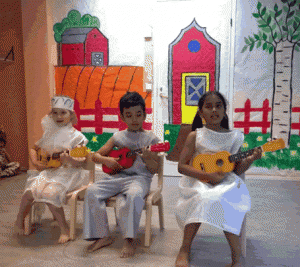Three decades ago Finland’s school system was not good at all. Although the classes were small in size, and students did lots of homework, and the teachers used hard disciplinary actions – still the results were not good. Students were demonstrating against the systems and cutting from classes. At some point in early 90s, the whole school system was reformed. Physical disciplining was no more allowed, exams were cut off, and teachers became rather guides for creative learning.
Commonly Finnish people, at any age, are very serious, honest and sincere by nature. The reformed model of education offered pupils freedom to do their best without pressure. Education and learning is very highly valued in Finland by children themselves, as well as parents, teachers, professionals, politicians and big business. Everyone has the same interest to get kids educated, and thus special attention is provided for any students lacking behind.
When agricultural and forest industry needed less work force, Finnish people understood the importance of education for the further success of the whole country as an industrial nation. It has never been so much question of getting high grades and gaining international recognition, but educating future professionals for the needs of big business, high quality healthcare system, research purposes etc. And the results have been good; PISA (Programme for International Student Assessment) ranks consistently Finland’s education system on the top internationally.
So what is their speciality of Finnish education system? Michael More has interviewed school authorities and pupils in Finland. His video describes some of the specific methods of Finnish cheap but effective school system comparing to other countries’ education systems. Children have very little homework, because ‘they need to explore things and have fun’ according the teachers. They don’t have competitive standardised tests before high school. They have to learn by using their own brain, which makes them creative, motivated, happy and more “Where To Invade Next” by Michael Moore
Private schools in Finland are almost non existent. For example The Netherlands has 15 different school systems based on religion. Pre-school education has been rare in Finland compared with other EU countries, and primary education is usually started at the age of 7. Finnish schools have individual support for every student in need and daily health care facility available. Speech and other therapeutic services are provided also according needs.
Finnish pupils spend least time at school compared to other OECD countries. In 2010, Finnish children aged 9-11 spent an average 640 hours in school a year, compared to 899 hours in England, and 847 hours in France. And younger kids and their teachers spend only 20 hours/week in the school. The difference between weakest and best students is the smallest in the world and about 90 % of Finns graduate from high school.
Teachers are well tested, suitable and well educated. According international research, Finland is least corrupted country, so the officials really use the funds for education. Save the Children – organization ranked Finland best place to be a mother – starting when the child is born, every mother receives free clothes etc materials for the baby. Besides parents get regular benefits for the up keeping of the child until she/he is 16 years old.
Finland has also a long tradition of adult education, by the 1980s nearly one million Finns were receiving some kind of instructive education each year. Forty percent of them did so for professional reasons. Finland has more educators than most of the countries in the world.
What else related to education Finns are best on; In Finland people are using most libraries, every person borrows 18 books during year. In New York people borrow 8 books/ year, in London 4.8 and in Rio de Janeiro 0.03. Finnish people read more newspapers, than in other countries. Finland has more researchers than any other country. Helsinki is the most honest city in the world according Readers Digest. They dropped 12 wallets in 16 different cities. In Helsinki eleven from twelve returned the found wallet.
Alternative forms of education work better than the strict government controlled model. Finnish scholar Pasi Sahlberg, at Harvard thinks that for a small, agrarian nation, educating all of its youth equally well, is the best way to catch up with other industrialised countries. Pasi has popularised Finland’s methods abroad.’ [Source]. From the early 90s, Finland schools became responsible for their own curriculum planning and student assessment, while state inspections were abandoned. This required teachers to have high academic credentials. [Source] And What Makes Finland’s Teachers So Much Better…? Vic Bishop.
I was once working as a kindergarten teacher in Helsinki. We taught the kids to do everything themselves. They used to serve the food, bake cakes and feed the fish at the age of 4-5. I used to also give classes occasionally in different primary schools. I was impressed the way the teachers cared for the kids like they were their own. Even the uncooperative children were taken good care. Then while I was teaching in India briefly, it was quite different, the number of kids in classes was huge, so the teachers had to be very authorative. Some teachers werre banging the table in front of the kids with stick, but I never saw a child been beaten. Anyhow this would be another story to write about.
But not everything is that perfect in Finland. What I’m hearing, especially when the students reach the high school grade, they have lots of homework and exams, as they have not get used to them, they spend often many apprehensive sleepless nights. Also education is too independent for some students. As Finnish people are very serious and sincere they are often also critical. At the young age it often shows up as harassment towards different children. In older age the students may not express directly criticism, but some victims become subject to experience it due to others isolating them. Anyhow after all Finland is really doing its best with the education.
Update; Indeed, I just came across news about woman arrested due to planning a massacre in a Finnish school. According the writings of the woman herself she clearly seems to have mental problems and anger directed towards schools. May be she has been bullied in the school. So even the best school system in the world can’t prevent everything and this case was not the first at all. Finland has also a dark history of suicides and alcoholism, but I think in that Finns are advancing into better direction too. You may see my article about the school threat case which I just wrote; /eu/2016/09/just-school-massacre-planner-taken-into-custody-in-finland-2612164.html
Neohumanistic Education in Finland, photos from http://sunrisefinland.org/

A bit about Neohumanist Education Model
Neohumanist Education fosters love and respect for all, regardless of culture, religion, race or nationality, and also for animals, plants and the ecosystem. Yoga and meditation practises develop child’s potentiality in all three spheres of existence: physical, mental and spiritual. The very foundation of this education is happy blending of occidental extroversial science and oriental introversial philosophy.
Neohumanist Education awakens a thirst and love for learning, with integrity, self-confidence, self-discipline and cooperation. In order to encourage a universal outlook, teachers and parents have to be as examples and children are encouraged to help and work for the welfare of others too. Alternative medical treatments (medicinal plants, naturopathy, acupressure massage, etc) are introduced to them at early age.
Human beings use only a very small percentage of their inherent capacity – even great personalities waste ninety percent of their capacity, because they do not know how to utilize it. People are called poor, idiots and sinners, but rather we should encourage them to develop the noble qualities lying dormant in them. Every person is a VIP – a very important person!
For the all-round progress of human society as a whole, psychic and intellectual progress should be encouraged. But no more dogma – dogma seals the future of the human intellect. The intellectuality should be enlarged with the help of spiritual practises. If the especial subtle and refined propensities of human beings are developed properly, they will be gradually elevated to the status of divinity says the profounder of Neohumanist Education P. R. Sarkar.
Can any school party be more fun than this Spring River School Fest in Australia, amazing!
Didi Annapurna, if you post it, put my name and link it here, thanks!


Ei kommentteja:
Lähetä kommentti